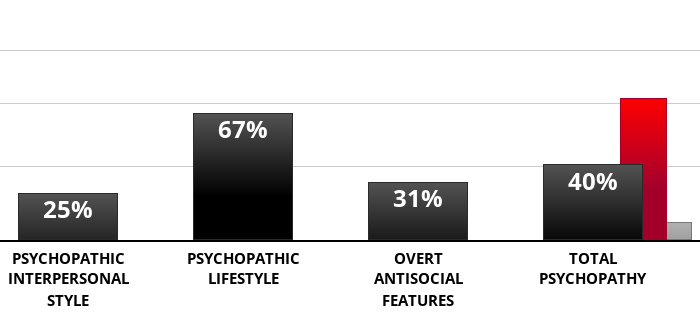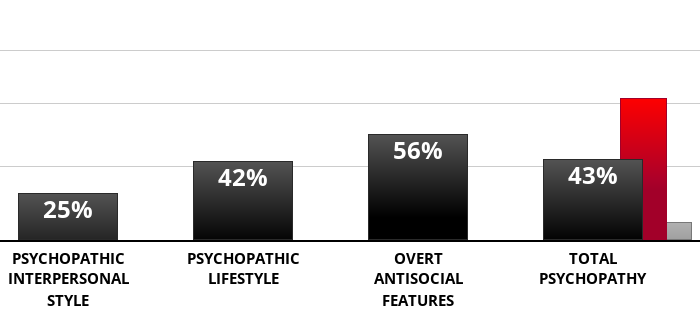Norexan
Quetzalcoatl
- Joined
- Jul 2, 2017
- Messages
- 2,219
- MBTI Type
- ENTJ
- Enneagram
- 8w7
- Instinctual Variant
- sp
Psychopathy Test

This makes you 30.5% more psychopathic than the average person.
Psychopathy Test
The person you attempted to rate is:
You
Psychopathy Threshold
Population AverageResult chart
This makes you 30.5% more psychopathic than the average person.
You do not qualify as a psychopath on the Psychopathy Checklist.
Explanation of Factors:
Psychopathic Interpersonal Style denotes selfishness, callousness, and the remorseless use of others. People high in this trait are characterized by shallow emotional lives, superficial charm, manipulativeness, and a lack of empathy.
Psychopathic Lifestyle indicates a tendency towards a chronically unstable, antisocial, and socially deviant lifestyle. Other elements of this style include sensation-seeking, irresponsibility, inability to hold a normal job, and/or the inability to maintain non-dysfunctional relationships.
Overt Antisocial Features include reactive anger, criminality, and a lack of impulse control. The likelihood is low that people who rate high in this dimension will mend their ways.
Total Psychopathy denotes the person’s total psychopathy score. Individuals in the 75-100% range are considered psychopaths on the Psychopathy Checklist. Individuals with scores below 75% are not.

This makes you 30.5% more psychopathic than the average person.
Psychopathy Test
The person you attempted to rate is:
You
Psychopathy Threshold
Population AverageResult chart
This makes you 30.5% more psychopathic than the average person.
You do not qualify as a psychopath on the Psychopathy Checklist.
Explanation of Factors:
Psychopathic Interpersonal Style denotes selfishness, callousness, and the remorseless use of others. People high in this trait are characterized by shallow emotional lives, superficial charm, manipulativeness, and a lack of empathy.
Psychopathic Lifestyle indicates a tendency towards a chronically unstable, antisocial, and socially deviant lifestyle. Other elements of this style include sensation-seeking, irresponsibility, inability to hold a normal job, and/or the inability to maintain non-dysfunctional relationships.
Overt Antisocial Features include reactive anger, criminality, and a lack of impulse control. The likelihood is low that people who rate high in this dimension will mend their ways.
Total Psychopathy denotes the person’s total psychopathy score. Individuals in the 75-100% range are considered psychopaths on the Psychopathy Checklist. Individuals with scores below 75% are not.


